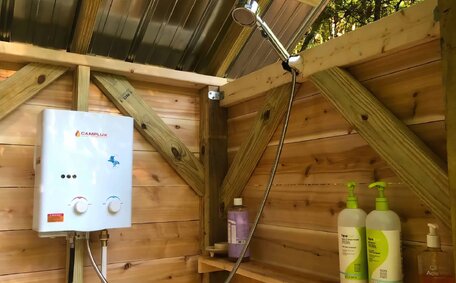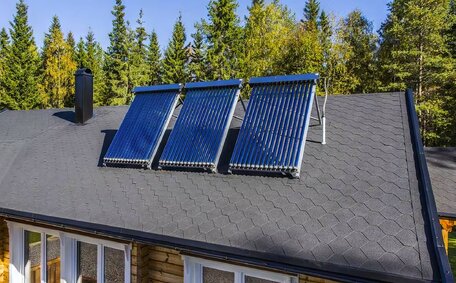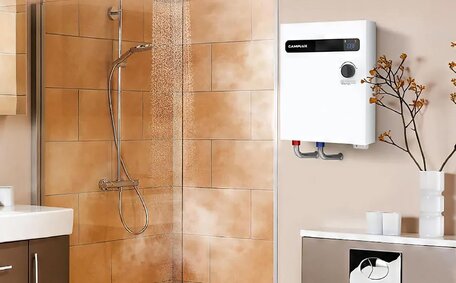Understanding How a Hot Water System Works
A fully operational gas hot water system heats cold water stored in a tank or instantaneously in tankless models, with key components:
- Water storage tank - Holds hot water in the water tank until needed. Found in storage tank systems.
- Heat exchanger - Serves as the core of your hot water system, using gas burners, electric elements, or solar panels as a heat source.
- Thermostat - One of the most common parts that controls water temperature in storage tank models, typically set between 50°C and 60°C.
- Tempering valve - Mixes hot water from your gas unit with cold water to reduce the risk of scalding.
- Pipes - Vital for transporting hot water throughout your home, ensuring it reaches taps and showers effectively.
The typical hot water systems encountered are:
- Traditional hot water storage tanks - Maintain heated water ready for use, providing a consistent supply from your water heater.
- Instant gas hot water and tankless models - Deliver hot water on demand with burners that ignite as you turn on the hot tap.
- Instant electric hot water heater - These units maintain a continuous flow of hot water, heating on demand without the need for a tank.
- Heat pumps - Efficient systems that absorb environmental heat from the air or ground to warm up water.
- Solar hot water solutions - Utilise solar panels to preheat water before traditional heating kicks in.
Ensuring your water remains within 50-60 degrees Celsius is crucial for preventing common water heater issues.
Common Hot Water System Problems Homeowners Face
Some of the most common problems that can affect hot water systems include:
- Leaks - Often occur from degraded seals or pipes, leading to water seepage and potentially causing flooding if left unaddressed.
- Insufficient hot water - Indicates an ineffective system, possibly from a faulty flow sensor or issues such as incorrect temperature settings, undersized tanks, malfunctioning heating elements, or reduced water flow.
- No hot water - Complete hot water failure often due to power outages, pilot light gone out, or heating elements that simply isnt working, or tank/pipe blockages.
- Overheating - A serious issue when water temperature is excessively high or too low, often due to malfunctioning thermostats or temperature sensors, posing energy waste and scalding risks.
- Strange noises - Unusual gurgling, hissing or banging sounds can also indicate internal problems or sediment accumulation.
Understanding how to address hot water system issues is crucial, and it’s often wise to call a professional for repairable issues provided they are identified and addressed diligently. We will explore resolutions for the above concerns in greater detail ahead.
No Hot Water
There are several potential reasons why you may have no hot water:
- Power outage - Inspect your gas circuit breakers and make certain power is connected to your hot water unit. Without power, as a result of failing to turn off power, electric water heaters won’t function and the gas pilot flame can’t be activated.
- Tripped circuit breaker - For electric systems, ensure the dedicated breaker hasn’t tripped as this supplies energy to you home’s appliances. Reset if needed.
- Pilot light issue - On your gas water heater, inspect the pilot light. If the pilot light has gone out, relight it as per the manufacturer’s instructions.
- Broken heating element - Electric water heaters rely on their elements to heat the water, and if these are broken, there’s a pressing need to get them replaced.
- Gas line issue - Check the gas supply is active and connected. Listen for whistling sounds near gas pipes, which may indicate a leak.
- Sediment build-up - Heavy deposits in common water heaters can block heat transfer and the water can experience decreased flow, resulting in no hot water.
Treat any hot water issue with urgency. Difficulty with hot showers, operating dishwashers, or having warm water for daily tasks is disruptive. Seek a plumber’s help if self-resolution fails.
Not Enough Hot Water
If you find there’s not enough hot water for daily tasks, there are a few usual culprits to investigate:
- Improper temperature setting - Double check your thermostat is set between 50°C - 60°C for optimal heating capacity.
- Small tank size - Your tank may be undersized for your household usage. Consider upgrading to a larger storage tank or tankless model.
- Faulty heating elements - Electric water heaters rely on elements to heat water. If worn or broken, replacement is required.
- Low water flow rate - Restricted pipes, strainers or a faulty tempering valve can limit hot water flow at outlets.
- Sediment build-up- Heavy limescale deposits in the tank reduces heating efficiency. Draining regularly helps prevent this.
First, try adjusting the heater’s temperature setting higher for more hot water. If problems persist after reviewing elements and water flow, consult a plumber for an inspection.
Water Temperature Issues
Temperature relief and regulation are crucial as settings set too low or too high encompass common issues hot water systems face, resulting in water egress being excessively hot or cold. Water that is too hot or too cold points to issues with the thermostat or temperature settings.
If you’re getting colder water than expected, some potential causes include:
- Thermostat set too low - Double check your thermostat temperature setting. It should be 50-60C.
- Faulty thermostat - If correctly set but your heater is still too cold, the device may be defective and require replacement.
- Sediment build-up - Heavy limescale deposits can prevent water from heating properly. Drain tanks annually.
- Underpowered system - An undersized unit may struggle to heat water to the desired temperature.
Conversely, excessively hot water usually indicates a thermostat malfunction or an improper setting:
- High temperature setting - Check your hot water thermostat and consider lowering it to 120-140F / 50-60C.
- Faulty thermostat - Fails to regulate temperature accurately. Requires service or replacement.
- No tempering valve - Mixes hot and cold water to reduce scalding. Should be mandatory.
Please give us a call for assistance with hot water system temperature adjustments or other related issues.
Low Water Pressure
There are several potential causes of low water pressure in your hot water system:
- Blocked pipes or valves - Scale build-up or debris can obstruct internal pipes or hot water valves, restricting flow to taps.
- Partially closed supply valve - Ensure the main water supply valve is fully open to maximise pressure.
- Faulty pressure relief valve - Stuck open relief valves allow pressure leaks, reducing available hot water flow.
- High demand - Using multiple hot water taps at once (e.g. shower, washing machine) can exceed available pressure.
- Water main issue - Consult your local water provider if pressure loss seems to affect both hot and cold water.
Initially, check if the low pressure is exclusive to hot water or also affects cold water to isolate the problem. Contact a licenced plumber for assistance if required.
Strange Noises
Strange noises like gurgling, popping, or hissing from your hot water system aren’t always alarming. Air pockets trapped in pipes can lead to gurgling sounds as water flows. Popping or creaking may indicate temperature fluctuations causing metal components to expand and contract.
Preventing dense accumulations preserves system efficiency and helps avoid disruptive noises.
Leaking Water
Addressing water problems like leaks is crucial in hot water systems. Left unresolved, significant leaks could result in extensive damage to your property. Catching water leaks and other problems early is key.
Common leak locations include:
- Storage tank - Corroded tanks or loose fittings/seals allow water escape. Dripping water under the tank is the telltale sign.
- Pipe connections - Loose fittings or worn washers at hot/cold water connections throughout your home can leak.
- Tempering valve - Leaking valves mix excess cold water, leading to tepid output temperature.
- TPR valve - Pressure relief valves that drip constantly must be replaced to prevent pressure loss.
Note any damp areas surrounding your system or newly elevated water bills. Catching leaks early minimises damage. Significant leaks likely need professional service to identify underlying issues and ensure full repairs.
Smelly Water
Unusual odours akin to sulphur or rotten eggs in your hot water could indicate bacterial growth within the water heater. As water sits stagnant in the tank, bacteria can accumulate and produce foul-smelling hydrogen sulphide gases.
A compromised water heater may also have an eroded anode rod, evident when discoloured water flows out, especially after increased hot water usage. Made from metal alloys, the anode rod protects the inside of your tank by attracting corrosion instead of letting it damage the tank itself. However, over time it erodes and begins producing a distinct "rotten egg" stench when it reacts with the heated water.
To resolve smelly water issues, start by draining the water heater tank completely, then refilling. This flushes out sediment and any hydrogen sulphide gases. If the rotten egg smell returns shortly after, the anode rod likely needs replacing by a professional to prevent further odour and corrosion problems down the track.
Preventative Maintenance
Routine maintenance is key to extending the lifespan of your water heating system and preventing common issues.
Homeowners should include their hot water system in the following preventative maintenance checklist:
- Drain the water heater tank annually via the drain valve to flush sediment buildup
- Inspect pipes and connections for leaks and tighten fittings if loose
- Check and test the pressure relief valve to ensure proper operation
- Clear debris around electric heating elements and gas pilot lights
- Have a licenced plumber perform comprehensive hot water system servicing every 3-5 years
While tasks like draining and inspection can be DIY, professional servicing can detect issues early. Preventative maintenance can save money long-term by increasing the lifespan of your flawlessly operating hot water system.
Contact us for hot water service checks, maintenance assistance, or to discuss routine servicing.
When to Call a Professional Plumber
Regular maintenance and minor repairs can be DIY, but for more severe issues, a professional plumber’s assistance is crucial.
It is advisable to call a licenced plumber if you encounter:
- Total hot water system failure
- Major leaks causing extensive water damage
- Faulty electrical components putting safety at risk
- Persistent rotten egg odours signalling corrosion
- Connections requiring pipe work modifications
- Issues under manufacturer warranty needing certified service
As your local hot water experts, Cranebrook Plumbing offers reliable diagnostics and repairs for all makes and models. Our fully licenced and insured plumbers are available 24/7 to assess problematic water heaters.
Contact us at 1300 349 338 or [email protected] to book an appointment. Let your plumber handle your complex plumbing headaches.
How We Can Help
At Cranebrook Plumbing on the Gold Coast, we understand the hassle and disruption that plumbing issues can cause. As your trusted local plumber serving Cranebrook and surrounding suburbs, we aim to provide prompt, reliable solutions whether you’re facing a burst pipe at 3 AM or simply want advice on maintaining your water heater.
With extensive experience, our licenced and insured plumbers diagnose and resolve residential and commercial plumbing issues with precision. Our services cover everything from fixing leaky taps and unclogging drains to repairing gas lines, rodding sewers, installing water heaters, and more.
Trust Ryan, our experienced professional, to get your home or business plumbing back on track when problems arise. Services we provide include:
- 24/7 emergency plumbing
- Burst pipe repair
- Blocked drain cleaning
- Water heater repair and replacement
- Residential and commercial plumbing maintenance
- Gas line inspections and leakage repair
- Sewer rodding and drain cleaning
- Leak detection services
- Pipe relining solutions
- Plumbing inspections
Don’t delay action on your water service issues or pipe problems. We service all makes and models and offer free quotes.
Our preventative maintenance optimises drainage systems and prolongs the lifespan of water heaters. Contact Cranebrook Plumbing at 1300 349 338 or [email protected] to request an appointment.






